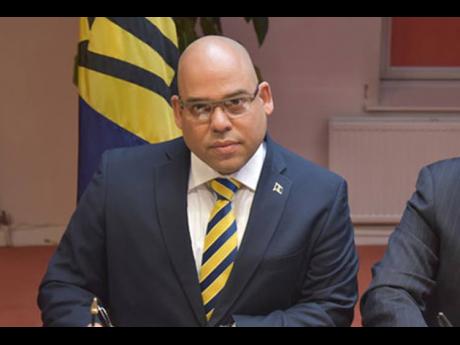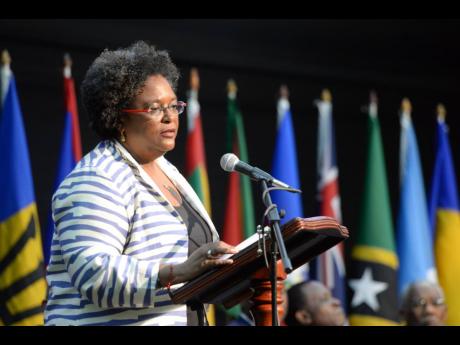Guy Hewitt | Emancipation from mental slavery – Barbados, ‘Mother Country’ and republicanism
Barbados’ recently pronouncement to become a republic, separating from Her Majesty The Queen (HMTQ) as head of state, is noteworthy not only for what it says about the island paradise, but also about changes in perception of Britain and its monarchy.
There is legitimacy in the stance taken by Prime Minister Mia Amor Mottley. A toddler at ‘Little England’s’ independence (as Barbados was referred to) in 1966 , this new but already highly regarded Caribbean leader possess a strong nationalist and regional sentiment. For her, like many born in the independence era, with many leading Commonwealth Caribbean countries already republics, republicanism is a coming of age.
This decision was a while in coming. The 1998 Constitutional Commission recommended the change from an external, hereditary monarchy to a native presidency. In 2003, Barbados proudly conveyed its decision to replace the British Judicial Committee of the Privy Council with the Caribbean Court of Justice as its final court. In 2016, during the country’s golden jubilee independence celebrations, Freundel Stuart, the erstwhile prime minister, spoke of the “move from a monarchical system to a republican form of government in the near future”.
While expected, the decision was not anticipated. There are many who want to divorce but can’t pursue it. The ties between Barbados and the UK are strong. Historically a prized colony, the statue of Lord Nelson in the capital, Bridgetown, predates the one in London. Today, Barbados is the only Caribbean destination that has Britain as its primary tourist market and the only one to which British Airways offers a first-class service.
The timing of playing the republican card was strategic. The issue dominates local political discourse rather than the other proposed legislative changes towards same-sex unions and decriminalisation of marijuana use, which would normally evoke greater consternation. The republican debate also serves to distract from the reality that due to COVID-19, Barbados’ tourism-based economy is in its most dire situation since its independence.
As in Britain, ‘Bimshire’ (a colloquial name) held Queen Elizabeth II, as queen of Barbados, in highest regard. In 1999, I witnessed Barbados’ initial republican aspirations die prematurely at Brixton Town Hall. The meeting featured an erudite presentation by late Prime Minister Owen Arthur to the Barbadian diaspora on independence and economic enfranchisement, with specific mention given to becoming a republic. In the Q&A session, a former Bajan deputy high commissioner pointedly asked Arthur, “What had the queen done to you that you want to get rid of her?” The ire of the vociferous monarchists was such that I did not foresee this royal divorce until Prince Charles ascended the throne.
ALTERED PERCEPTIONS
The Windrush scandal and the Black Lives Matter movement altered perceptions of the colonial ‘Mother Country.’ The Windrush scandal, Brexit vote, and a growing anti-Semitism indicate that Britain remains ill at ease with matters of race and migration. Ethnically, it is clearly not a united kingdom. In the Windrush scandal, Britain, credited with writing the rules of justice, tolerance and fair play, would violate them all.
The Windrush scandal, a consequence of Theresa May’s ill-conceived, xenophobic immigration policy ‘to create a really hostile environment for illegal immigrants’, negated the rights of many elderly, West Indian-born, long-time UK residents. The less fortunate got detained, some deported. However, the root of the Windrush scandal was the perpetuation of institutional racism exposed in the 1999 Macpherson Report.
When West Indians initially landed in Britain, they were denied their rights as full citizens of the United Kingdom and colonies. Under the 1948 Nationality Act, their journey was an act of internal migration, no different to the movement of the English, Scots, Welsh and Northern Irish within national borders.
The bias against these West Indians was further reflected by the fact that they were not treated as anomalies to be regularised, but, instead, as ‘illegal immigrants’. Insult was added to injury when the burden of proof was placed on those already ‘under suspicion’ to prove to the Home Office their right to remain in the UK.
Although apolitical, HMTQ has acted to guide British sentiment during crises. Having done this during the 2014 Scottish Referendum by urging voters to “think very carefully about the future,” she could have similarly acted in her role as head of the Commonwealth when the Windrush scandal erupted on the eve of the Commonwealth Summit. Encouragement from her to the British government to reinforce its commitment, in its new role of Commonwealth Chair-in-Office, to multiculturalism and the rights of all its citizens would have been welcome and justified.
When the then Duke and Duchess of Sussex asserted that Britain should confront its “uncomfortable history” as it relates to colonialism and racism, during a discussion with young Black leaders from across the Commonwealth, they gave added impetus for Britain to move away from its racial and ethnic disunity. Hope faded with Harry and Megan’s subsequent separation from the Royal Family; Barbados followed their road less travelled.
From across the pond, I observed fellow Brits join the worldwide Black Lives Matter protests demanding an end to systemic and institutional racism. While I don’t condone the destruction of public property, the spontaneous dismantling of the statue of known slaver Edward Colston in Bristol was symbolic. Given that many of those enslaved were killed at sea, it would have been cathartic for protesters, particularly those with black Caribbean ancestry, to commit Colston’s likeness to a watery grave.
INSTITUTIONAL RACISM
Clearly, the Home Office hasn’t overcome the institutional racism exposed in its handling of the Windrush scandal. While Priti Patel accepted all 30 recommendations of the Windrush scandal review, the Home Office demands that Windrush victims prove their case for compensation for pain and suffering “beyond reasonable doubt,” the standard normally reserved for criminal matters. Having already experienced injustice, distress and trauma at the hands of the Home Office, victims suffer further.
Those sceptics who in 2018 dismissed Windrush Day as political spin and an attempt to push the issue on to a political backburner were proven right. The lingering Windrush scandal is a blot on Britain’s socio-political landscape and a repudiation of its notions of fair play.
Hope springs eternal. In July, on ITV’s ‘Good Morning Britain’, Mottley, noting the continued problem of “mental slavery,” renewed calls for reparations by Britain and other former colonial powers for the holocaust of the transatlantic slave trade. She subsequently appointed a Special Envoy for Reparations and agreed to relocate the statue of Lord Nelson.
Her actions echoed the words of Errol Walton Barrow, first prime minister of Barbados, at the 1966 Independence Conference at Lancaster House, when he declared that Barbados would not “be found loitering on colonial premises after closing time”. In becoming a republic, this small island developing state helps expose the tarnished underbelly of global Britain. I anticipate that others will follow suit. Vive la République!
The Reverend Ambassador Guy Hewitt was Barbados’ first London-born high commissioner to the UK. He ended his public-sector career to serve God. He is a priest in the Episcopal Diocese of Southeast Florida. Send feedback to columns@gleanerjm.com.


